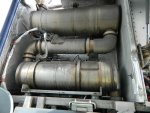daytonatrbo
Member
- 320
- 3
- 18
- Location
- Tricities, TN
Only very expensive carbon/carbon brakes maintain effective stopping when heated until glowing.I specified the use of the pinion brake as an emergency brake. I know is spins much faster. That is also why it is very effective for braking. Monster trucks using military axles use pinion brakes and they get them to glow bright red from the heat. But they darned sure stop. And this would be using a disk brake and pads which are much more tolerant and forgiving of the heat.
My point is, even in a 1-off emergency, you would smoke a typical brake rotor/caliper setup using it to try to haul a deuce to a stop via the pinion flange.



